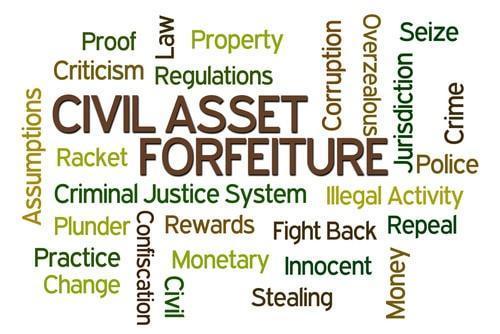Understanding Civil Asset Forfeiture Laws in Illinois
 Anyone who has been arrested on criminal charges faces a great deal of financial hardship, including bail, court fees, fines, attorney’s fees, and the possible loss of income. But what many people do not know is that when they are arrested, police can seize their money or property if they believe that it was used to commit a crime. This is known as civil asset forfeiture.
Anyone who has been arrested on criminal charges faces a great deal of financial hardship, including bail, court fees, fines, attorney’s fees, and the possible loss of income. But what many people do not know is that when they are arrested, police can seize their money or property if they believe that it was used to commit a crime. This is known as civil asset forfeiture.
While civil asset forfeiture is meant to provide law enforcement with tools to disrupt the activities of large scale criminal organizations, the practice has come under fire in recent years due to its increased use in a wide variety of criminal cases. Organizations such as the American Civil Liberties Union (ACLU) have argued that law enforcement officials disproportionately target lower-income individuals who do not have the resources to prove their innocence and reclaim their property.
These claims are backed up by studies from journalistic organizations such as Reason and the Chicago Reader, who analyzed data about civil forfeitures in Cook County. These studies showed that low-income neighborhoods in Chicago’s south side and west side were disproportionately targeted, especially for seizures of amounts less than $100.
Changes to State and Federal Civil Asset Forfeiture Laws
In order to address complaints about the improper use of civil asset forfeiture, the Illinois state legislature passed legislation in June 2017 updating the laws around this process. House Bill 303 requires the state to provide proof that seized property was used in the commission of a crime, rather than requiring property owners to convince a court of their innocence in order to reclaim their property. The law also increases transparency by requiring police to maintain a database of seized property and the distribution of seized assets. As of July 2017, the law is awaiting Governor Bruce Rauner’s signature.
However, this law may be complicated by recent developments at the federal level. In July 2017, Attorney General Jeff Sessions updated the Justice Department’s policy on civil asset forfeiture. This new policy reverses a restriction made to civil asset forfeiture in 2015 under the Obama administration, and it allows state and local law enforcement to bypass state laws and share seized assets with federal authorities. The policy does provide some safeguards against abuse by providing training for state and local law enforcement officials and requiring federal prosecutors to approve cash seizures of less than $10,000.
Understanding Your Rights When Arrested on Criminal Charges
If you have been arrested and charged with a crime, you need to be sure you are aware of the potential penalties and understand your rights when addressing these charges in court. Having a knowledgeable attorney on your side to advocate for your rights throughout the process is essential. Contact an experienced Luisi Legal Group Chicago criminal defense lawyer at 773-276-5541 today to schedule a free consultation.
Sources:
http://www.ilga.gov/legislation/BillStatus.asp?DocTypeID=HB&DocNum=303&GAID=14&SessionID=91&LegID=99457
https://www.aclu.org/blog/speak-freely/reform-finally-coming-illinoiss-unjust-civil-asset-forfeiture-laws
https://www.nytimes.com/2017/07/19/us/politics/justice-department-civil-asset-forfeiture.html
http://reason.com/blog/2017/06/13/poor-neighborhoods-hit-hardest-by-asset





 773-276-5541
773-276-5541










